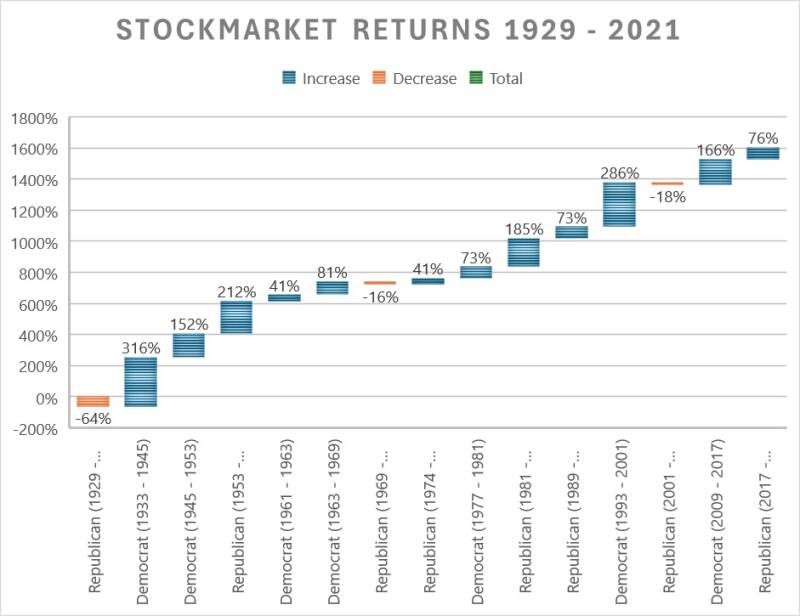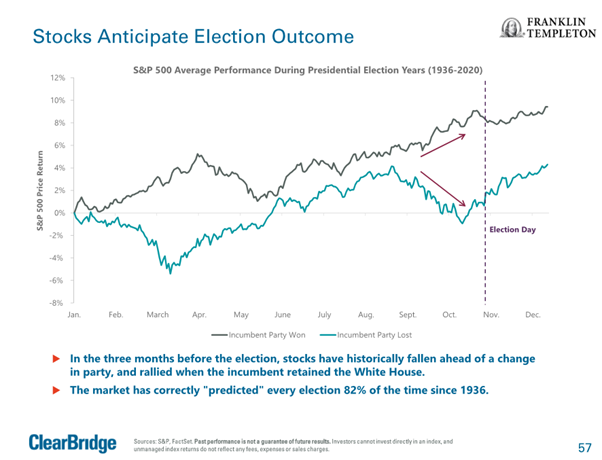
The US operates under a two-party system: the Democratic Party formed in 1828 and the Republican Party in 1854. The President can only have two terms of four years each. However, the US political system also includes the Senate and House of Representatives. A President can be from one party and the Senate and House of Representatives another!
Americans seem very loyal to their parties despite what they may feel about the leader. In all elections, the person who wins is often decided by a minority of people, the swing voters. Between 1952 and 1980, this was 12% of the electorate, and now it is thought to be around 3%.
Ironically, you can get a higher share of votes and still not become President. Hilary Clinton lost to Donald Trump even though she achieved a 48.2% share of the votes vs. Trump, who took a 46.1% share. The same happened with Al Gore, who took 48.3% of the vote, and George W Bush, who took 47.9%.
The chart below shows the political party of US presidents from 1789 to 2021.

The question is, does it matter who wins the US election?
Looking at the data
The latest polls indicate that this again could be a close election. But then, every election is close!

Research by the Economic Policy Institute indicates that the Democrats tend to have more favourable outcomes in terms of the economy:

The reality is that although the politics and rhetoric change, markets and companies adapt to whatever party is in power. The chart below shows stock market returns under the different Presidents between 1929 and 2021:

Potentially, the most significant risk is the ripple effect of Trump's victory and his desire to protect US interests. China could suffer from this, and other countries that have benefited from moving away from China (India, Indonesia, Brazil, Mexico, Poland, and Turkey) and Europe struggled under the last Trump regime. There could be other moves, such as withdrawing support for Ukraine. But as with everything, there is a great deal of uncertainty.
Turning back to the data, markets tend to be good at predicting the outcome of elections. Stocks tend to fall ahead of a change in party and rally when the incumbent is retained:

Ultimately, the outcome tends to come down to the economy:

Biden or Trump
The margin between the two is likely to be tight. According to an Ipsos poll, the election could swing on Trump's conviction or jail time.

Taking the outcome of the trial out, this chart perhaps indicates how the election may play out:

We can’t predict the outcome; however, history indicates that if there is growing optimism in the US economy, Biden will win. Ultimately, the outcome is decided by a small group of people, and that is becoming harder to predict.
To conclude
To conclude, it is important to reflect that globally, markets still offer value. Even though the US seems expensive, much of this is skewed by the big tech stocks. Ultimately, as economies recover, and assuming interest rates and inflation come down, we should continue to see that recovery in markets irrespective of who wins the US election.

In summary, there are fears about what “America First” under Trump could mean, but ultimately, markets and companies are resilient to whoever wins.
Disclaimer: Please note these are my thoughts. There are no recommendations within this. I am not regulated, nor can I provide advice. I would always recommend seeking advice from a financial planner before making any investment decisions. Investments can also fall and go up, and past performance is no guide to the future.


Add comment
Comments